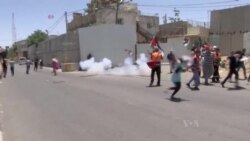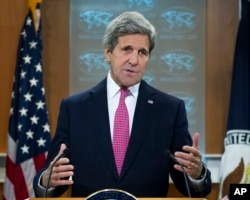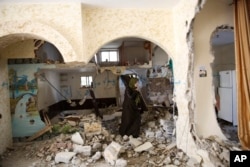Despite the recent escalation in violence between Israelis and Palestinians, and the fact that representatives of these two parties are not even scheduled to attend the French-brokered resumption of talks aimed at ending the conflict, there is a glimmer of hope on the horizon with the swearing in Monday of ultranationalist Israeli Defense Minister Avigdor Lieberman, who said he supports a two-state solution.
U.S. Secretary of State John Kerry did not give up hope for a lasting agreement to end the Israeli-Palestinian conflict after the peace talks process he brokered fell apart in April of 2014. He held tight to his vision of two states for two peoples, living side by side in peace and security, even as some called it a "fool's errand" and the two principal parties involved refused to speak to one another.
There now is a small opening, with Israel’s hawkish Lieberman saying he supports “two states for two peoples.” And the top U.S. diplomat appears as determined as ever, despite the dwindling months remaining in the current administration, as he prepares to attend a ministerial meeting Friday in Paris, where the resumption of talks aimed at ending the Israeli-Palestinian conflict is the focus.
Indirect Talks
The French-led initiative, aimed at helping to move beyond the current stalemate, will include ministers and delegates from the so-called Middle East Quartet (the United States, Russia, the European Union, and the United Nations), and the Arab League. There is no scheduled participation, however, from representatives of either Israel or the Palestinians.
While direct talks between Israelis and Palestinians seem unlikely anytime soon, Kerry said recently “in the end, the parties have to negotiate,” adding “what we are seeking to do is help encourage the parties to be able to see a way forward so that they can understand that peace is indeed a possibility.”
Experts have cautioned, though, that the chances of a genuine open-minded discussion are dim.
“I think June 3rd could produce something in terms of moving the process forward,” regional expert Natan Sachs from the Brookings Institution told VOA. "There’s a lot of will, especially among the powers — the U.S. and now France — to get something going. They might get Israel to acquiesce somewhat to this kind of idea, but a major breakthrough, a major movement in the peace process - that remains quite low.”
Sach noted that the Israelis rejected the idea of an international conference because it was viewed as one that is intent on imposing a solution upon them.
Pave the Way
The gathering of ministers, without Israelis or Palestinians attending, is planned to pave the way for an international conference to set new parameters for negotiating a Palestinian state alongside Israel.
“We’re never going to abandon efforts to bring about a two-state solution. We said we support direct talks, obviously, but not for the sake of talking, only when both sides are ready to come and talk real issues,” said State Department spokesman Mark Toner recently in a briefing.
In an earlier statement, the Middle East Quartet expressed serious concern about current trends on the ground, including continued acts of violence against civilians, ongoing settlement activity, and the high rate of demolitions of Palestinian structures.
They “are dangerously imperiling the viability of a two-state solution,” said the statement.
Separately, Kerry will meet with French Foreign Minister Jean-Marc Ayrault to discuss issues including combating Islamic State terrorists.
After Paris, Kerry will travel to Mongolia and China. He will meet with senior government officials, host a town hall with young leaders, and attend a traditional Mongolian cultural festival.
In Beijing, the top U.S. diplomat will discuss a wide range of bilateral, regional, and global issues with his Chinese counterpart during the eighth round of the high-level U.S.-China Strategic and Economic Dialogue.







